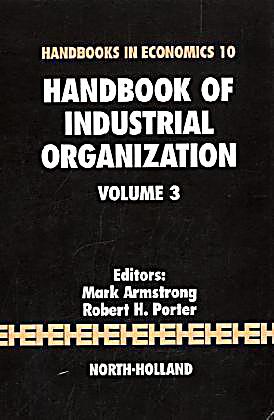This table was put together based on a summary of information provided by Dunnette (1990) in the Handbook of Industrial and Organizational Psychology, Volume 1. There are some signs that science and practice are beginning to blend despite the forces above. People-related business issues; industrial psychology scores very low on the critical scales of industry. This failure to solve people-related business issues is epitomised by Campbell (1990, p. 57): “If we have learned anything about applied problem solving in industrial and organizational psychology, it is that the.
This is Vol 3 of the Handbook of Industrial Organization series (HIO). Vols 1 & 2 published simultaneously in 1989 under the editorship of Richard Schmalensee and Robert Willig. Many of the chapters in these successful volumes were widely cited and appeared on graduate reading lists, and some continue to appear even recently. Since the first volumes published, the field of industrial organization has continued to evolve. As the editors acknowledge in the Preface, these volumes had some gaps and this new volume aims to fill some of those gaps. The aim is to serve as a source, reference and teaching supplement for industrial organization, or industrial economics, the microeconomics field that focuses on business behavior and its implications for both market structures and processes, and for related public policies.The first two volumes of the HIO appeared at roughly the same time as Jean Tirole's book The Theory of Industrial Organization. Together they helped revolutionize the teaching of industrial organization, and provided a state-of-the-art summary.

Pdf Handbook Of Industrial Organization Definition
Tirole's book is concerned with the relevant theory, and several reviewers noted that the first two volumes of HIO contained much more discussion of the theoretical literature than of the empirical literature. In most respects, this imbalance was an accurate reflection of the field. Since then, the empirical literature has flourished, while the theoretical literature has continued to grow, and this new volume reflects that change of emphasis.Part of the renown Handbooks in Economics series.Chapters are contributed by some of the leading experts in their fields.A source, reference and teaching supplement for industrial organizations, or industrial economicists.
This chapter is a historical overview of the evolution of industrial and organizational (I/O) psychology both in the United States and abroad, from the late nineteenth century to its current incarnation as a complex, wide-ranging scientific and applied discipline. Contextual background is integrated with the development of science and practice from a chronological perspective, partitioning this history into seven somewhat arbitrary time periods. Following a discussion of pre-1900 precursors, we discuss the genesis of the field from 1900 to 1914, when dynamic cultural, economic, and other external forces influenced early efforts in areas such as advertising, fatigue, and selection. Locoroco midnight carnival psp iso. Industrial psychology became established from 1915 through 1919, due in large part to the work of the Division of Applied Psychology at the Carnegie Institute of Technology and to psychologists’ efforts in World War I.
The period of 1920 to 1939 included the influential Hawthorne Studies and the maturation of industrial psychology, while 1940 to 1959 saw considerable expansion during World War II and its aftermath. This expansion continued during the period of 1960 to 1979, with “industrial” psychology now “industrial-organizational” psychology. We close with an overview of developments from 1980 to the present day.Keywords.

Access to the complete content on Oxford Handbooks Online requires a subscription or purchase. Public users are able to search the site and view the abstracts and keywords for each book and chapter without a subscription.Please or to access full text content.If you have purchased a print title that contains an access token, please see the token for information about how to register your code.For questions on access or troubleshooting, please check our, and if you can't find the answer there, please.